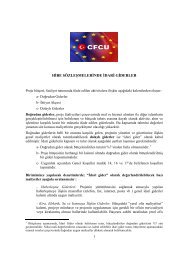Project Cycle Management Training Handbook - CFCU
Project Cycle Management Training Handbook - CFCU
Project Cycle Management Training Handbook - CFCU
You also want an ePaper? Increase the reach of your titles
YUMPU automatically turns print PDFs into web optimized ePapers that Google loves.
8<br />
<strong>Project</strong> <strong>Cycle</strong> <strong>Management</strong> <strong>Training</strong> <strong>Handbook</strong><br />
Stakeholder<br />
involvement in<br />
decision-making<br />
track, or to modify some of its objectives in the light of any<br />
significant changes that may have occurred since its formulation.<br />
➅ During the Evaluation phase, the funding agency and partner<br />
country assess the project to identify what has been achieved, and<br />
to identify lessons that have been learned. Evaluation findings are<br />
used to improve the design of future projects or programmes.<br />
Although in the generic cycle the evaluation phase comes after<br />
implementation, it is common practice also to conduct a mid-term<br />
evaluation during implementation, to identify lessons that can be<br />
applied during the remaining life of the project.<br />
Aid cooperation and partnership programmes with non-member states<br />
involve often-complex processes that require the active support of<br />
many parties. Experience among the main donors has shown that too<br />
many decisions concerning projects have been taken without<br />
sufficient consultation with beneficiaries and stakeholders, and<br />
without the necessary information. The purpose of the project cycle is<br />
to ensure that the stakeholders take the decisions, and that decisions<br />
are based on relevant and sufficient information.<br />
The separation of the cycle into six phases provides the minimum<br />
basis for effective project preparation, implementation and evaluation.<br />
The separation of the Identification and Formulation phases is<br />
particularly important. <strong>Project</strong> preparation takes place in a social and<br />
political context, where expectations are raised and often-conflicting<br />
demands and aspirations must be reconciled. By adhering to the<br />
identification phase, the relevance of project ideas can be<br />
systematically established before the preparation process is too far<br />
advanced for the idea to be dropped. During the formulation phase,<br />
project ideas can then be fully developed in the knowledge that they<br />
are based on real beneficiary needs and are sufficiently ‘owned’ by<br />
the main stakeholders.<br />
Add your own notes here…





